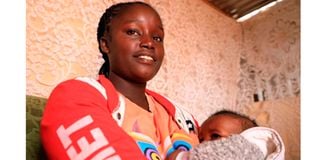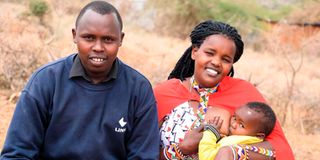Premium
Kenya celebrates World Breastfeeding Week a month earlier due to elections

Florence Muthoni breastfeeds her child in this photo taken on July 1, 2022 at Ole Serian area in Kajiado County. World Breastfeeding Week is celebrated between August 1 and 7, but was celebrated a month earlier in Kenya due to the General Election.
World Breastfeeding Week is celebrated across the world every year between August 1 and August 7, but this year it was celebrated a month earlier in Kenya due to the General Election planned for August.
In a memo from the Ministry of Health, the division of nutrition and dietetics, which coordinates the national celebrations, said that because of campaigns and the polls, the festivities were brought forward and held on July 1-7.
Ms Veronica Kirogo, the head of nutrition and dietetics, said the national launch was held on July 5 at Mbagathi Hospital in Nairobi.
This year’s celebrations focused on the links between breastfeeding and good nutrition, food security and reduction of inequalities, Health CS Mutahi Kagwe said at the launch.
The Warm Chain campaign, he said, puts the mother-baby pair at the centre and coordinates efforts to provide a continuum of care during the first 1,000 days of a child’s life.

Loice Ntagusa breastfeeds her child in this photo taken on July 1, 2022 at Ole Serian area in Kajiado County.
Key actors in the chain include health systems, workplaces and the community. To sustain the Warm Chain, he said, existing and potential actors should be recognised, as well as the role of initiatives such as the Baby Friendly Hospital and Baby Friendly Community initiatives and workplace support for breastfeeding mothers. This, he said, empowers mothers for an effective breastfeeding experience and establishes referral and linkages throughout the Warm Chain.
He said that in the last decade, Kenya has supported breastfeeding by improving policies, guidelines and legislative frameworks that guarantee the basic nutrition for every child in line with the Constitution.
This, the CS stated, has contributed to a significant increase in the proportion of children exclusively breastfed in the first six months from 32 percent in 2008 to 61 percent in 2014, according to the Kenya Demographic Health surveys.
Mr Kagwe noted that World Breastfeeding Week is championed by the World Alliance for Breastfeeding Action in 170 countries, including Kenya.
He stated that the campaign aims to inform, anchor, engage and galvanize action on breastfeeding and related issues to protect, promote and support breastfeeding.
The CS noted that the Breast Milk Substitutes (Regulation and Control) Act, 2012, and Legal Notice No. 184 on Breast Milk Substitutes (Regulation and Control) (General Regulations), 2021, came to effect on May 30, are some of the laws and regulations enacted to promote breastfeeding.
Others include the Health Act, 2017, which supports breastfeeding at the workplace, and the Employment Act, 2007, which provides for maternity protection.
“The regulations prescribe how certain sections of the Act are to be implemented in order to curb continued violation of breastfeeding guidelines. We urge … continued compliance and enforcement in order to realise the intended purpose of these legislative instruments,” Mr Kagwe said.
The World Health Organization (WHO) and Unicef recommend that breastfeeding be initiated within the first hour of birth and that children be exclusively breastfed for the first six months.
Breastfeeding is also encouraged for up to two years or beyond. Breast milk provides all the nutrients a baby requires in the first six months of life. It continues to provide up to half or more of a child’s nutritional needs during the second half of the first year, and up to one-third during the second year of life.
Breastfeeding has been shown to have immense benefits for the mother, child, families and communities.
To celebrate World Breastfeeding Day, Save the Children International (SCI) has been training Kajiado women and creating awareness about the critical role that exclusive breastfeeding plays.
The objective is to share information on breastfeeding, focusing primarily on the benefits of breastfeeding.
In Kenya, SCI, in partnership with Unicef and the World Food Programme, is implementing a safety net cash programme called Universal Child Benefit as part of a pilot scheme funded by SC Italy and other donors along with the Ministry of Labour and Social Services and the Ministry of Health.
The pilot is for 12 months, with the child grants being distributed bi-monthly to 8,300 households in Kisumu, Embu, and Kajiado counties. It also includes provisions to support nutrition, positive parenting and disability services.
Loyce Sianoi Ntagusa, 25, a mother of four, is one of the beneficiaries of the project. She told the Nation she has learned a lot from the training.
She has expanded her knowledge about nutrition and reevaluated some of the practices she had grown used to.
“I had a home birth for my firstborn and what a traditional midwife taught me is not what I know now,” she said.
“Since I started attending these sessions, I have realised some of our practices are wrong. We need to change. Those were just old traditions.”
She now encourages women to visit clinics during pregnancy; consider delivering at a clinic or hospital where complications can be addressed more quickly; eat a diversified and nutritious diet; grow small home gardens; and breastfeed exclusively for the first six months of their infants’ lives in lieu of the traditional practice of feeding them fresh animal blood mixed with milk.
Ruth Mbuthia, a nutrition officer with SCI in Kajiado, said that many mothers know the importance of breastfeeding and sensitisation programmes were meant to give mothers tips on exclusive breastfeeding.
She challenged mothers to maintain healthy living by eating a balanced diet to provide the right nutrients for the babies through breast milk.
“A lactating mother needs to be healthy, by ensuring they get a proper balanced meal that gives the body the required nutrients and energy to be able to take care of the baby,” she said.





